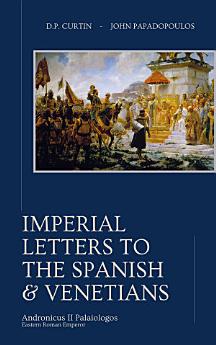Imperial Letters to the Spanish & Venetians
Andronicus II Palaiologos · D.P. Curtin
Jul 2025 · The Byzantine Church (476-1453 AD) Book 99 · Dalcassian Press
Ebook
18
Pages
family_home
Eligible
info
reportRatings and reviews aren’t verified Learn More
About this ebook
In 1290, Emperor Andronicus Palaeologus responded to a petition from Spanish merchants, represented by consul Sir Dalmain Suner, by issuing a golden bull that granted them significant privileges. This document allowed merchants from regions such as Parezalona, Ragusa, Catalonia, Mallorca, Valencia, and Tortosa to settle in Constantinople and engage in trade freely. They were assured protection from harm and oppression, with specific provisions concerning import and export duties. Additionally, it safeguarded their goods in the event of maritime emergencies. This decree aimed to enhance trade relations and provide security for the merchants' interests.
About the author
D.P. Curtin is an Irish-American antiquarian and translator. To date he has translated over seven hundred texts relating to the development of the Western World between the 5th and 15th centuries. The various manuscripts which he has handled are of sundry cultural provenance, including: Celtic, Gallic, Visigothic, Punic, Nubian, Nordic, Slavic, Ethiopian, Coptic, Celtic, German, Armenian, Arabic, Byzantine, Syriac, Anglo-Saxon, and Georgian. He holds a AB from Villanova University, Masters from Chestnut Hill College, and a doctoral degree from Chatham University in Pittsburgh, PA.
Rate this ebook
Tell us what you think.
Reading information
Smartphones and tablets
Install the Google Play Books app for Android and iPad/iPhone. It syncs automatically with your account and allows you to read online or offline wherever you are.
Laptops and computers
You can listen to audiobooks purchased on Google Play using your computer's web browser.
eReaders and other devices
To read on e-ink devices like Kobo eReaders, you'll need to download a file and transfer it to your device. Follow the detailed Help Center instructions to transfer the files to supported eReaders.










